“The truth, respectfully, is not a threat. The truth is my constitutional Right.” Anarel

Tarot Spread
Justice: You saw it. And you didn't flinch. That was your first mistake.
The Moon: Bringing the truth to light didn’t clear the fog. It made the monsters visible.
Ten of Swords: They stabbed you in the back and handed you the knife to carry.
Victorious: You didn’t win with applause. You won only because you refused to disappear.
Story: The Village
Vietnam, 1969-70.Quảng Ngãi Province. Delta sector.
Humidity like soup. Blood like rust in the air.
Cobalt had been operating under MACV-SOG—Special Operations Group—but you’d never find his name in the briefings. He was the ghost in the wire, the eyes behind the recon reports. Off-book. Embedded for observation and intelligence collection. That was the line. But Vietnam didn’t care about lines. It blurred everything.
He’d been riding with Charlie-Echo for three weeks. Long enough to know the squad was cracking. Long enough to know Monroe was the wrong man to give orders in a war where there were no rules.
Monroe was tall, Southern, always grinning. He called the locals “ducks” and thought Geneva was a town in Texas. His boys followed him because he bought the first round and gave them permission to become animals.
Cobalt didn’t follow him. He followed the pattern. And the pattern said this unit was getting sloppy.
It was a dawn sweep. Intel—questionable at best—said an NVA courier had passed through a hamlet along the Son Tra River. Nine huts, two fishing boats, zero resistance.
Monroe gave the order:
“Sweep it clean.”
To the grunts, that meant one thing: burn it down.
Cobalt knew the smell before he saw the smoke—flesh and gasoline, the stench of something sacred being torched. He moved through the village perimeter, hand on his sidearm, camera tucked under his blouse.
He heard the first shot before he saw the body. A girl, maybe ten. Head snapped back like a puppet with its strings cut. No gun in her hands. No danger. Just mud and screams and blood soaking into the straw.
Inside the main hut, Monroe was kneeling over an old man, punching his face in with the butt of an M16.
“Tell me where the VC are, old fuck!”The man didn’t speak English. That didn’t stop the rifle stock.
Cobalt snapped the shutter once. Then again.
Another soldier—Rodriguez—was dragging a woman out by her hair, laughing. Another was pouring kerosene on a rice bag like it was sport.
Cobalt didn’t intervene. That wasn't the mission. His mission was to witness.
So he watched.
He documented.
He didn’t stop it.
And that was the part that kept him up at night.
That night, in the bunker, he sent the film through an encrypted pouch. Red-coded dispatch. High-priority. Straight to the command node at Da Nang.
He expected silence. He didn’t expect retribution.
Three days later, Monroe pulled him into a radio shack behind the firebase.
“You think you’re some kind of hero?” Monroe asked.“I think you murdered civilians,” Cobalt replied.“I think you don’t understand how we win this war.”
The smile was gone.
Monroe leaned close, voice low:
“You try to take me down, I take you with me. Nobody’s hands are clean in this place, soldier.”
That night, Cobalt’s cot was gone. His locker trashed. His name struck from the flight manifest. A week later, they reassigned him to a clerical post near Bien Hoa—filling out ration forms while Monroe kept killing villagers under a different codename.
The message was clear: shut up, or disappear.
Cobalt didn’t shut up.
He made copies of the photos. Stashed them in water-tight tubes. One went to a priest in Saigon. One went to a French journalist who owed him a favor. The last, he mailed to himself under a false name at a New York PO box.
Then he vanished.
The story hit three months later.
Front page of Le Monde.Then The Times.Then everywhere.
“Black Fire in Quảng Ngãi”Eyewitness accounts. Photo evidence. Names. Unit numbers. Command signatures. The whole operation exposed.
Congress opened a hearing.
The Army opened a file.
But Cobalt’s name wasn’t in the story.
He’d already burned that identity.
Years later—1975—when the hearings were long over and the war was ending in shame, Cobalt stood outside the federal building in D.C. It was spring, but the air still tasted like war. Wet concrete and burnt paper.
Different haircut, different beard, different experience, same eyes.
A newscaster spotted him. He recognized the eyes.
“You were part of the investigation, right?”“I was the investigation.”“You’re not in the files.”“Good.”
She looked confused.
“Why blow the whistle and disappear?”“Because if I stayed, I’d be dead. And the story would’ve died with me.”
She looked at him, hesitating, then asked the question every reporter asks:
“So after everything they did to you... why did you do it?”
Cobalt looked past her. Past the glass doors. Past the seal of justice etched in the stone.
Then he spoke, slow and clean:
“Because the truth, respectfully, is not a threat—it is my constitutional right.”
He didn’t wait for her to scribble it down.
He just walked away.
Boots steady. Shoulders straight.Another war behind him.Another truth that didn’t go quietly.
He could still fear the jungle, distant oratory notes of rot, fear and death.
But at least he was able to lay his sword down.
Postscript: This story is fiction. The truth it carries is not. The names have been changed. Except one. The bones beneath them haven’t.
